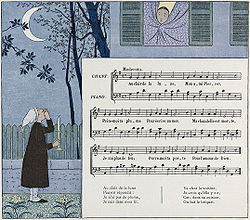- Au clair de la lune
-
Not to be confused with Clair de Lune.
"Au Clair de la Lune" (French pronunciation: [o klɛʁ də la lyn(ə)], By the light of the moon) is a French folk song of the 18th century. The author is unknown. Its simple melody (
 Play (help·info)) is commonly taught to beginner students of the glockenspiel, as it provides an easy way for students to become comfortable with how notes are played on their instrument.
Play (help·info)) is commonly taught to beginner students of the glockenspiel, as it provides an easy way for students to become comfortable with how notes are played on their instrument.Contents
Lyrics
The song is now considered a lullaby for children but carries a double entendre throughout (the dead candle, the need to light up the flame, the God of love, etc.) that becomes clear with its conclusion.
- Au clair de la lune
- Mon ami Pierrot
- Prête-moi ta plume
- Pour écrire un mot
- Ma chandelle est morte
- Je n'ai plus de feu
- Ouvre-moi ta porte
- Pour l'amour de Dieu
- Au clair de la lune,
- Pierrot répondit :
- « Je n'ai pas de plume,
- Je suis dans mon lit.
- Va chez la voisine,
- Je crois qu'elle y est,
- Car dans sa cuisine
- On bat le briquet. »
- Au clair de la lune,
- L'aimable Lubin;
- Frappe chez la brune,
- Elle répond soudain :
- -Qui frappe de la sorte ?
- Il dit à son tour :
- -Ouvrez votre porte,
- Pour le Dieu d'Amour.
- Au clair de la lune,
- On n'y voit qu'un peu.
- On chercha la plume,
- On chercha le feu.
- En cherchant d'la sorte,
- Je n'sais c'qu'on trouva ;
- Mais je sais qu'la porte
- Sur eux se ferma..
In English:- By the light of the moon
- My friend Pierrot
- Lend me your pen
- To write a word
- My candle is dead
- I have no more fire
- Open your door for me
- For the love of God
- By the light of the moon,
- Pierrot replied
- I don't have any pen,
- I'm in bed
- Go to the neighbor's,
- I think she's there
- Because in her kitchen
- Someone is using the lighter
- By the light of the moon
- likable Lubin
- Knocks on the brunette's door
- she soon responds
- Who's knocking like that?
- He then replies
- Open your door
- for the God of Love!
- By the light of the moon
- One could barely see
- The pen was looked for
- The light was looked for
- With all that looking
- I don't know what was found
- But I do know that the door
- Was shut behind them.
In classical music
19th-century French composer Camille Saint-Saëns quoted the first few notes of the tune in the section The Fossils, part of his famous suite The Carnival of the Animals.
1860 recording
Main article: PhonautographIn 2008, a phonautograph paper recording made by Édouard-Léon Scott de Martinville of Au Clair de la Lune on April 9, 1860 was digitally converted to sound by U.S. researchers. This one-line excerpt of the song was widely reported to have been the earliest recognizable record of the human voice and the earliest recognizable record of music.[3][4]
According to those researchers, the phonautograph recording contains the beginning of the second verse of the song, "Au clair de la lune, Pierrot répondit...".[4] It has also been reported that the recording contains the beginning of the song, "Au clair de la lune, mon ami Pierrot...".[5][6]
References
- ^ http://www.firstsounds.org/sounds/scott.php
- ^ http://www.firstsounds.org/sounds/1860-Scott-Au-Clair-de-la-Lune-05-09.ogg
- ^ Jody Rosen (March 27, 2008). "Researchers Play Tune Recorded Before Edison". New York Times. http://www.nytimes.com/2008/03/27/arts/27soun.html.
- ^ a b FirstSounds.org (March 2008). "First Sounds archive of recovered sounds, MP3 archive". First Sounds. http://www.firstsounds.org/sounds/.
- ^ "Un papier ancien trouve sa " voix "" (in French). Radio-Canada.ca. 28 March 2008. http://www.radio-canada.ca/arts-spectacles/PlusArts/2008/03/28/001-phonautographe.asp. Retrieved 19 November 2008.
- ^ Jean-Baptiste Roch (13 May 2008). "Le son le plus vieux du monde" (in French). Télérama. http://www.telerama.fr/techno/le-son-le-plus-vieux-du-monde,28783.php. Retrieved 19 November 2008.
External links
- Listen 1931 recording by Yvonne Printemps. Webpage includes full lyrics.
Categories:- French folk songs
Wikimedia Foundation. 2010.


